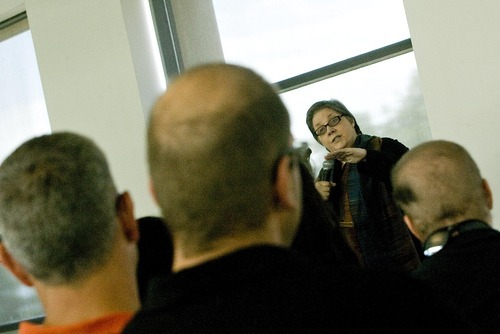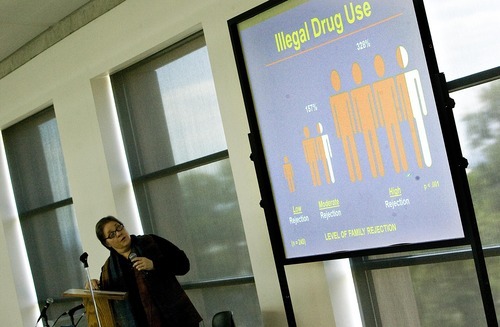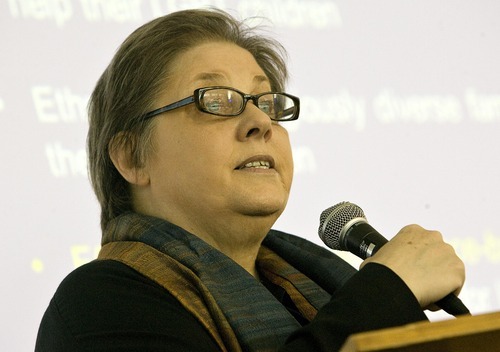This is an archived article that was published on sltrib.com in 2011, and information in the article may be outdated. It is provided only for personal research purposes and may not be reprinted.
Gay kids who face rejection from their families are three times more likely to use drugs or contract HIV. But more "startling and shocking," they are more than eight times more prone to committing suicide.
Armed with those sobering statistics, the Human Rights Campaign spent its second day in Salt Lake City Saturday on a nationwide bus tour to promote gay rights and awareness.
"Parents who reject their children are really socializing them to think they will live in a world that will never support them," Caitlin Ryan, with the Family Acceptance Project at San Francisco State University, told about 50 people during a panel discussion at the Main Library.
Ryan, who has pioneered research on behavioral dynamics between lesbian, gay, bisexual and transgender youth and their parents, said families who try to force their standards of masculinity or femininity tend to push their gay child toward depression, drug abuse or worse.
To avoid a teen's sense of hopelessness, Ryan says it is crucial for parents of LGBT kids to embrace their boyfriends or girlfriends and to recreate together.
"There's a perception very often that when a parent is rejecting their child, they don't love them. Actually they do," Ryan added. But giving parents the tools to build bridges toward acceptance, she stressed, is key.
That can be especially challenging in Utah, according to Kathy Godwin, president of the Salt Lake chapter of Parents, Family and Friends of Lesbians and Gays (PFLAG). She told the panel it is easy to find peer groups and programs in the capital city, but more difficult in the "isolated" suburbs.
"In Salt Lake City there's so many things for youth," Godwin said. "But that's not true in Herriman or Lehi or even parts of Layton. We need to make sure the families know what's out there. One thing we find about families is they're craving information — and they're craving to talk about it."
Valerie Larabee, executive director of the Utah Pride Center, said some Salt Lake City families also feel "unsafe" having an LGBT conversation with their child — "so imagine how unsafe they feel" in places like Provo and Vernal.
"Utah families may need a wake-up call with regard to this issue," said Larabee, noting she heard this weekend of another youth-suicide attempt. "This is a very serious, serious gap in our state. We don't talk about it."
That trend is slowly improving, according to Kathy Bray, president and CEO of Volunteers of America in Salt Lake City.
"I don't really think we used the words 'open and affirming' until more recently," she said. "Historically there's just not been a lot of information within a lot of social-service programs on how to be inclusive and helpful. But that is getting better."
Larabee did say the reality of LGBT youth forming "secondary families" at youth centers — where staff would rarely encourage teens to reconnect with their real family — is starting to shift.
The mood of Saturday's presentation was not all dark. Inside the sun-splashed, fourth-floor meeting room, Sharon Groves, director of HRC's religion and faith program, praised Utah's LGBT service providers as "second to none." (She said the same thing about the showcase Main Library.)
"You're doing it in a spirit of generosity that frankly takes my breath away," Groves said. "You actually seem to like each other."
Few young people attended the panel. But Myles Davis, youth program coordinator for the Utah Pride Center, offered a window into the psyche of LGBT youth. It is "very damaging," he said, to tell gay teens they need therapy.
"What a lot of them want is to feel like they can go to these spaces, whether it's school, whether it's home or whether it's work, and feel safe."
The Human Rights Campaign bus will roll out of Salt Lake City Sunday — across the Midwest and through the South — to stress that point.
Equality tour continues
The Human Rights Campaign's three-day tour of Salt Lake City concludes Sunday with two events. A 5K run-walk to benefit Volunteers of America's efforts to build a transitional home for homeless young men is scheduled for 10 a.m. at Liberty Park. It marks the last chance for residents to see the "On the Road to Equality" bus.
A panel discussion focusing on using faith to advocate for LGBT rights is scheduled for 2-4 p.m. at the Episcopal Church Center of Utah's Wasatch Room, 75 S. 200 East.
For more information about the HRC events, go to hrc.org/roadtoequality.







